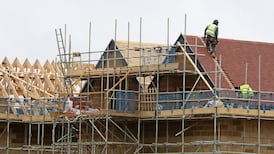The Irish economy is on track to comfortably outpace any other euro-zone state this year, according to new figures from the Central Statistics Office (CSO).
The numbers show that gross national product (GNP) was 4.2 per cent stronger in the three months to the end of September than in the same period a year ago. While this represents a slight slowdown on the previous two quarters, it still leaves growth for the first nine months of the year running at 4.9 per cent.
Most economists are expecting full-year growth to top 5 per cent, driven ahead by a heavy construction spend and buoyant exports.
The performance stands in marked contrast to much of the rest of the euro zone, which continues to languish in virtual stagnation. This is particularly the case by the gross domestic product (GDP) measure, which was up by 5.8 per cent in the third quarter.
GDP includes the profits of foreign multinationals based in the Republic, while GNP excludes these. The disparity between the two can be attributed to foreign firms repatriating their profits outside the country.
"Even a catastrophic fourth quarter would not stop Ireland from being the common currency area's fastest-growing economy in 2004," said economists at Davy Stockbrokers last night.
A breakdown of the latest CSO data shows that while the economy remained very solid over the third quarter, it may have lost some of its strong momentum as the months progressed.
Export growth fell from 6.6 per cent in the second quarter to a still-healthy 4.1 per cent in the three months to September. Imports were considerably weaker, thus allowing net exports to boost overall economic growth.
Growth in new housebuilding slowed to a trickle in the three months to September, thus pushing the investment component of growth lower.
Investment levels climbed by 15 per cent in the second quarter but this slowed to 3.6 per cent in the third quarter. Annual growth in Government spending also eased, falling from 3.1 to 2.5 per cent.
Consumers raised their spending levels slightly, but spent just 2.8 per cent more in the third quarter than in the same period a year ago. Some economists believe consumer spending could be even weaker in 2005.
IIB Bank's Mr Austin Hughes suggested yesterday that a fall-off in construction activity could combine with export pressures next year to drive GNP growth down to 4 per cent.
Mr Alan McQuaid of Bloxham Stockbrokers said consumers are unlikely to splash out to any great extent until Government-sponsored Special Savings Incentive Accounts (SSIAs) begin to mature in 2006.
Dr McLaughlin of Bank of Ireland is more optimistic. He expects "latent" demand to push up consumer spending next year. He is at the top end of forecasts for 2005 with a GDP projection of 6 per cent.











